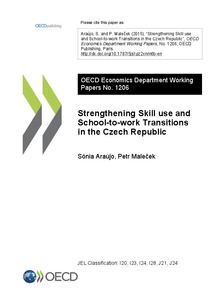Strengthening skill use and school-to-work transitions in the Czech Republic
"The education system has reacted slowly to changes in labour market needs, leading to an increasing number of school leavers without sufficient qualification. In addition, declining PISA scores and a rising share of low achievers are raising concerns about the quality of the future labour forc...
| Main Authors: | , |
|---|---|
| Institution: | ETUI-European Trade Union Institute |
| Format: | TEXT |
| Language: | English |
| Published: |
Paris
2015
OECD |
| Subjects: | |
| Online Access: | https://www.labourline.org/KENTIKA-19112843124919300259-Strengthening-skill-use-and-sc.htm |
| Summary: | "The education system has reacted slowly to changes in labour market needs, leading to an increasing number of school leavers without sufficient qualification. In addition, declining PISA scores and a rising share of low achievers are raising concerns about the quality of the future labour force. These factors play a role in the stalled income convergence process. Indeed, practices such as early tracking, streaming and low transferability between academic tracks hamper employability, human capital accumulation and social mobility. In the vocational education and training system, resources continue to be allocated on a historical basis. A more endogenous adjustment of the system to better align students’ qualifications with labour market needs requires active participation of social partners, students and education institutions. The rapid expansion of tertiary education without a corresponding increase in resources has led to fears about declining quality. Quality in tertiary education can be fostered by modifying the accreditation system, introducing student fees, strengthening the links with the private sector and foreign research networks and publicising information on labour market outcomes by field of study and higher education institution. Measures to better balance family and work lives can improve career options for women and therefore reduce the current tensions between having children and full time labour market participation of younger women. This could also ease the coming labour shortages associated with population ageing. This Working Paper relates to the 2014 OECD Economic Review of the Czech Republic (www.oecd.org/eco/surveys/economic-survey-czech-republic.htm). " |
|---|---|
| Physical Description: | 44 p. Digital |

